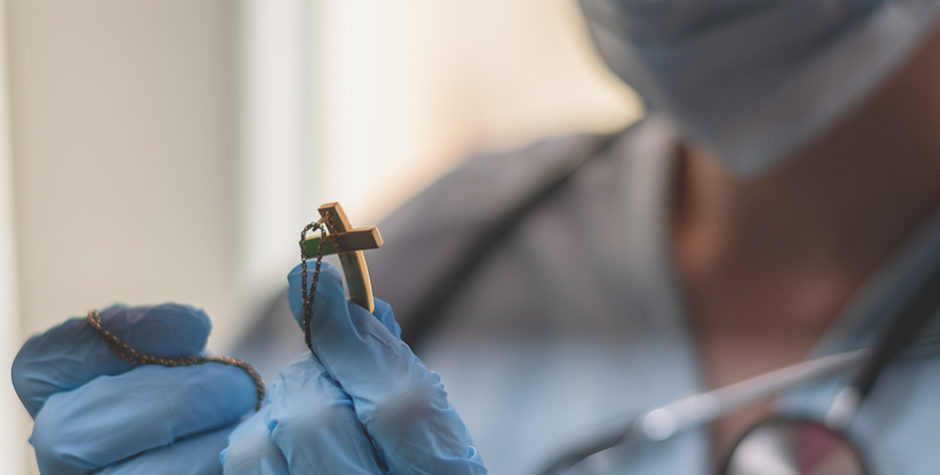Despite Federal Protections, Even Religiously Affiliated Hospitals Continue to Pressure Pro-Life Medical Professionals to Participate in Abortions
Despite federal laws meant to protect them, pro-life doctors and nurses are still being pressured and coerced into assisting in procedures they have moral objections to – like abortions – for fear of losing their jobs.
The ACLJ is working diligently to defend their constitutional rights of conscience which protect healthcare workers from that extremely unwelcome scenario.
We recently told you that we had filed an amicus brief with the Court of Appeals for the Second Circuit defending the Department of Health and Human Services’ (HHS) new Rule “Protecting Statutory Conscience Rights in Health Care.” We had also filed formal legal comments supporting the new rule.
The rule is meant to protect pro-life medical workers from being forced to participate in abortions without fear of reprisals from their employers or feeling pressured to quit their jobs. Unfortunately, while federal conscience laws are on the books, they aren’t being strictly enforced as they should be; and as a result, doctors and nurses who object to abortion are still being pressured to carry them out. And religious hospitals, where one might expect the sanctity of precious unborn lives to be respected, are no exception.
According to a recent report by the National Catholic Register:
Despite federal and state laws designed to protect conscience rights, Catholic medical professionals and their advocates report that health-care institutions routinely pressure their employees to provide or refer for services to which they morally object — and Catholic institutions are not immune to this tendency.
The article even states that according to some officials, the instances of conscience violations might even be more egregious in these Catholic facilities, which is unacceptable.
Dr. Jozef Zalot, a staff ethicist at the National Catholic Bioethics Center (NCBC), says that it is “not uncommon” to receive inquiries even from employees at Catholic health-care institutions who feel that their consciences are being violated. “In fact, I’ve had doctors tell me that actually, in a lot of cases, secular hospitals do a better job of protecting conscience than do Catholic hospitals. It’s bad.”
The ACLJ continues to hear from nurses and other medical workers whose livelihoods are being threatened because of their moral objection to killing innocent unborn babies. We’re currently representing a nurse with over forty years’ experience who was told by hospital officials that she could be terminated for just candidly expressing her opposition to performing abortions to her colleagues. Another medical professional notified us that he’d been forced to sign a form that, while purportedly recognizing a conscience-based opt-out right, contained so many easily abused exceptions that it essentially amounts to a professional target on his back.
We’ve also told you how we recently filed a Complaint with the Department of Health and Human Services’ Office of Civil Rights on behalf of a nurse who was misled into participating in a horrific late-term abortion. Our client recounted having to watch in horror as what she was originally informed would simply be a routine procedure following an unfortunate miscarriage turned out in truth to be the abortion of a 6-months’ gestational age infant.
Our client felt she had no choice but to do as she was ordered, for fear of losing her job. Following the awful procedure, she informed her supervisor that she couldn’t participate in any future abortions due to her religious beliefs, and they shockingly responded, “[Y]ou have no choice.”
To this day, our client suffers from mental anguish and the flashbacks of seeing a dying, struggling infant looking up at her from a metal “specimen” dish. It’s horrifying and cannot be tolerated. Conscience protections must be strictly enforced, and hospitals that violate the rights of their staff need to be held accountable.
The National Catholic Register article highlighted our pro-life work at the ACLJ, and included an interview with ACLJ Senior Counsel Francis Manion regarding our own work defending healthcare professionals and urging widespread enforcement of conscience protection laws.
“In just the past two weeks,” Manion told the Register last month, “I have spoken with a nurse threatened with termination for questioning her hospital’s allowing an abortion to be performed, a doctor threatened with firing over her request to be accommodated when faced with administering a certain drug that she believes is an abortifacient, and a technician told he must sign a form that would effectively require him to participate in abortions whenever his employer unilaterally decides that patient care requires him to.”
Not surprisingly, abortion giant Planned Parenthood hates these conscience protections and sued HHS, joining 20 states and several major cities in challenging the Rule in New York federal court. The Plaintiffs presented a fictional catastrophe scenario, in which enforcing conscience protections would somehow spell the eradication of healthcare as we know it. That’s a million miles from the truth, of course, but it didn’t stop a Left-leaning district court from striking down the rule.
HHS appealed to the Court of Appeals for the Second Circuit, and we filed an amicus brief supporting the appeal, pointing out critical errors made by the lower court. Specifically, the district court incorrectly held that a different, completely unrelated law, Title VII of the Civil Rights Act of 1964, constrained HHS’s authority to enforce the laws.
The pro-life work of the ACLJ does not stop. We continue to fight tirelessly for the rights pro-life nurses and doctors and to save defenseless babies.
If you are a medical worker who feels you’re being coerced or pressured to perform abortions or procedures to which you object, contact the ACLJ immediately. Or if you know someone who is facing this kind of situation, please encourage them to contact us at ACLJ.org/HELP. A member of our legal team will be in contact as quickly as possible.
